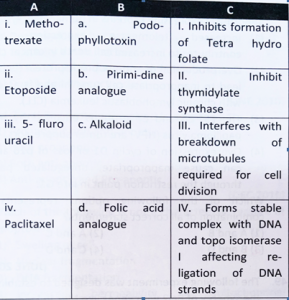44. Present-day cancer treatment uses many approaches. Beyond surgery and radiation treatment, which are most often employed in cases of larger, more discrete tumors, drug therapies can be used to target residual tumor cells and to attack dispersed cancers.
Chemotherapies by anti-cancer drugs are mostly aimed at blocking DNA synthesis and cell division. A list of anti-cancer drugs is given in column A, their chemical nature in column B and their mechanism of action in column C.
(1) i-a-l, ii-b-ll, iii-c-lll, iv-d-lV
(2) i-b-ll, ii-a-lll, iii-d-l, iv-c-lV
(3) i-c-lll, ii-d-lV, iii-a-ll, iv-b-l
(4) i-d-l, ii-a-lV, iii-b-ll, iv-c-lll
Based on the search results and existing knowledge, the most accurate answer to the question about the classification of chemotherapy drugs, their chemical nature, and their mechanisms of action is:
(2) i-b-ll, ii-a-lll, iii-d-l, iv-c-lll
Explanation:
-
i-b-ll:
Alkylating agents are chemical compounds that work by adding an alkyl group to DNA, leading to DNA damage and preventing tumor cell replication. Examples include cyclophosphamide and cisplatin. (Mechanism: DNA alkylation leading to cross-linking and DNA damage). -
ii-a-lll:
Antimetabolites mimic natural metabolites and interfere with DNA synthesis, particularly during S-phase of the cell cycle. Examples include methotrexate and 5-fluorouracil, which inhibit enzymes like dihydrofolate reductase or thymidylate synthase. -
iii-d-l:
Anti-tumor antibiotics such as doxorubicin and bleomycin bind DNA and inhibit topoisomerase II, leading to DNA strand breaks and apoptosis. These typically intercalate into the DNA structure. -
iv-c-lll:
Microtubule inhibitors, including vinca alkaloids and taxanes, interfere with microtubule dynamics during M phase, causing cell cycle arrest. Vinca alkaloids inhibit microtubule assembly, and taxanes stabilize microtubules, preventing their disassembly.
Summary Table
| Column A (Drug Type) | Column B (Chemical Nature) | Column C (Mechanism of Action) |
|---|---|---|
| Alkylating agents | b – Alkylating | ll – DNA damage via alkylation |
| Antimetabolites | a – Mimic metabolites | lll – Interfere with DNA synthesis (enzyme inhibition) |
| Anti-tumor antibiotics | d – DNA binding | l – Intercalate into DNA, inhibit topoisomerase II |
| Microtubule inhibitors (Vinca, Taxanes) | c – Microtubule drugs | l – Disrupt microtubule dynamics, arrest M phase |



3 Comments
Kirti Agarwal
October 31, 2025Opt 4
Kajal
November 6, 2025Option 4
Sakshi Kanwar
November 18, 2025) i-d-l, ii-a-lV, iii-b-ll, iv-c-lll option 4